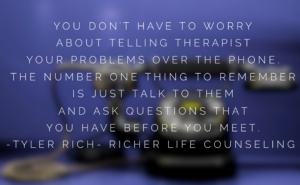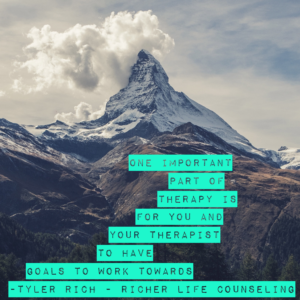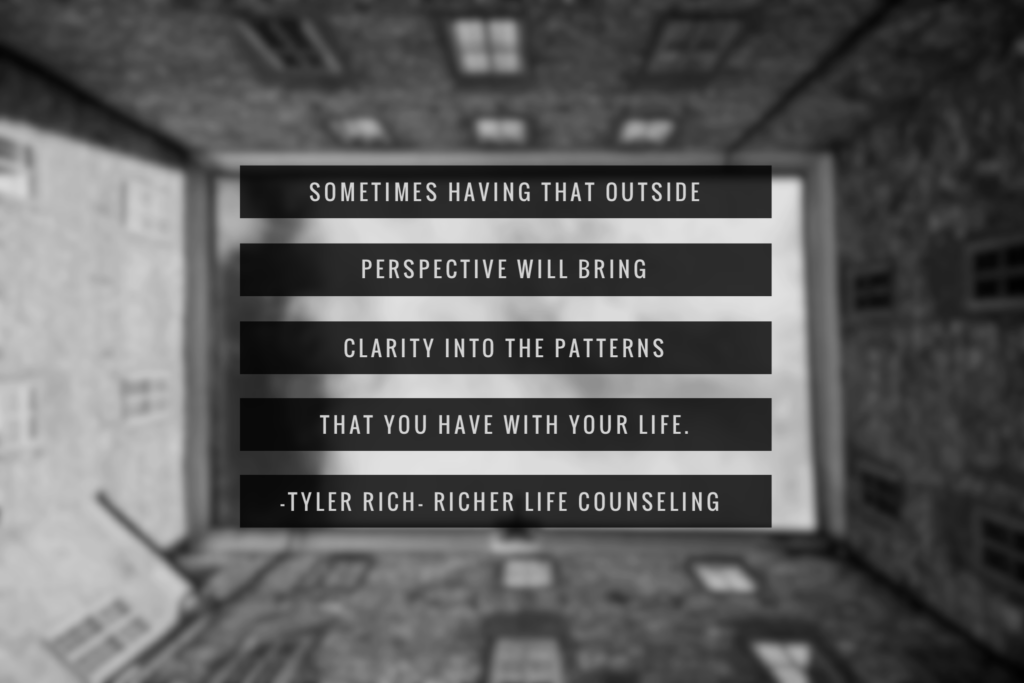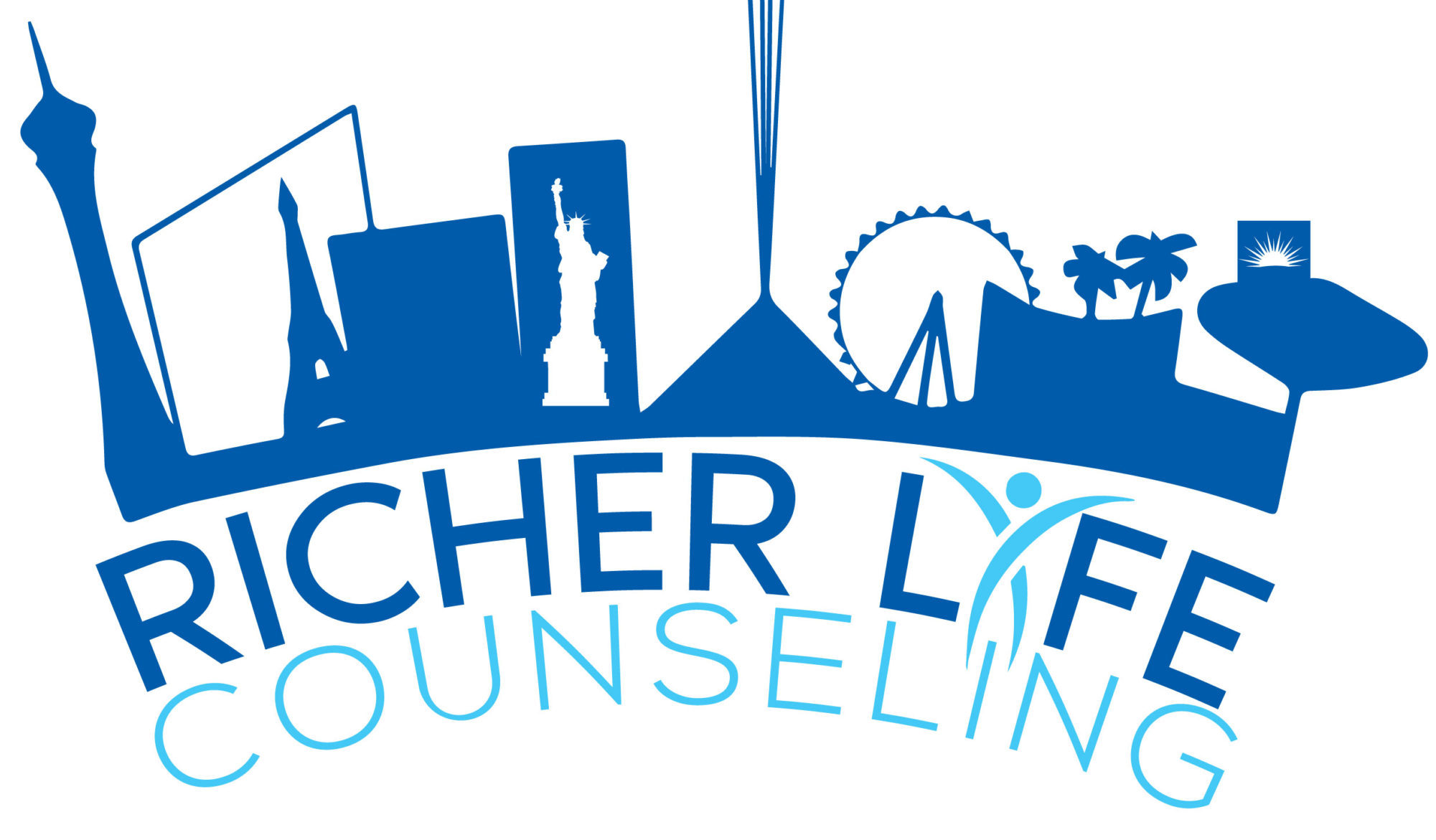If you have never gone to therapy before you might only be expecting to have the therapist ask you to lay down on the couch and start talking. TV and movies do a poor job of showing what happens inside a therapy session. I hope to answer some common questions and provide insight into what to expect during therapy from thinking about it, to making the call, and the first session.
only be expecting to have the therapist ask you to lay down on the couch and start talking. TV and movies do a poor job of showing what happens inside a therapy session. I hope to answer some common questions and provide insight into what to expect during therapy from thinking about it, to making the call, and the first session.
Richer Life Counseling Las Vegas Marriage and Family Therapy Presents
What to expect during therapy
Do you need it?
Has life just gotten too overwhelming, or you just don’t know what to do anymore?
Maybe you want to improve your relationship, or you need to try something in a last ditch effort to save your relationship. Maybe you just want to improve your overall sense of well-being. Check out my post on common reasons why people go to therapy to learn more about why therapy might be right for you. If you have made the decision that it’s time to start therapy, here is what to expect during therapy.
What to expect during therapy
Picking a therapist and contacting them
First figuring out what you are looking for will be key. You can learn more about different types of professionals, and the difference between counseling and therapy here. You will want to find someone in your area, how far away are you willing to drive. Does it matter if you meet with a man or a woman? If you have a particular issue, you can look for a therapist that works with that specific issue. While most therapists can work with any issues, some prefer only to work with what they specialize in. I can help all types of clients (you can read here on clients who I can help), and I like to specialize in helping the LGBT community . If you are in the Las Vegas area, you can contact me about if you are interested in counseling, and if I am not a good fit for you I can refer you to someone else who works with your issue.
When you call, make sure you think of any questions you will want to get answered before booking.
- You will want to ask about pricing
- Do they take Insurance
- What times do they see clients

You don’t have to worry about telling the therapist your problems over the phone. The number one thing to remember is just talking to them and ask questions that you have before you meet.
What to expect during therapy
First Session
Make sure you arrive early. Therapy can be nerve racking, or can raise your anxiety when you arrive early for your first session it will give you time to claim down and lower some of your anxiety before your session. Most therapists will have you start your paperwork before your session as to not take away from your session time.
Once your therapist brings you back to the office, the first thing that the therapist will do will be to go over the from call informed consent. You can read mine here. The informed consent will list all the policies such as the aspect of the counseling process, covering session cost, time, cancellation policy, and confidentiality. Once you have reviewed the informed consent, then the spotlight is on you.
The therapist might have a notebook or papers asking very specific questions that will fall into these areas

- What is your problem I always like to ask what brings you in to see me
- History of the problem How has it affected you and your life.
- Overall history Who are you, what is your current life like, what influences impacted you, what was it like growing up, anything that has to do with your history to give the therapist insight into who you are.
- Goals One important part of therapy is for you and your therapist to have goals to work towards. Sometimes that will mean physically writing them down on paper. For me, I always like to tell my clients it seems like we could work on this or that. We then have a verbal contract on what our goals are in therapy.
It might take a few sessions of meeting each other and reviewing your history, and the patterns of the problems before real growth can start to happen. This is especially true for couple’s therapy, it takes longer to hear the relationship history, each of your individual history, and see the patterns emerge clearly. Therapy is a process if you feel it is not happening at the speed you think is appropriate, you should talk to your therapist about these feelings.
What to expect during therapy
Your Job in therapy
In my post, about ten more common myths about therapy, one myth I disproved in that therapy is a passive process. That means that you have a responsibility to yourself to take an active role in doing certain things in and out of the session
Things that you are responsible for 
- Asking questions If you don’t understand something or your therapist is talking is psychobabble ask them what they mean. The only way to learn about yourself is to ask questions
- Be honest Sometimes looking deep within yourself is hard, but having an honest look at yourself will lead to growth and change.
- Try new things Sometimes your therapist will have you do new things that you might not want to do. This is where taking the leap of faith and trusting the process. If you try something and don’t like it tell your therapist but if you are unwilling to try new things you will not experience the growth that you want.
- Do your homework From journaling to changing behaviors, to exercising are all types of homework that I give my clients this homework is to take what happens in the therapy office and apply it throughout the week. If you expect to change by only doing work for one hour a week during therapy, you might not experience change. This homework is not busy work it is a way for you to change your life.
- Talk about when you want to stop therapy This process of growth and development is your journey. If you feel like you, have reached your goals, and are ready to stop therapy talk to your therapist about how you are feeling. Together you can develop a plan on how you would like to stop therapy.
What to expect during therapy
Therapist job during the session
While you are responsible for your part, your therapist will be responsible for the following.
- Let us worry about the clock I have some clients who watch the clock and will lead in saying ok times up. Don’t worry about keeping an eye on the clock, focus instead on your story, and the change process.
- I will state your issues in a different way Sometimes your therapist will state what is going on in some different ways. This can change the way you look at your issues. This reflecting and reframing is an important aspect of counseling, and will hopefully help you learn to look at your problems different ways
- Help you see the patterns within your life Sometimes having that outside perspective will bring clarity into the patterns that you have within your life.
- Let us manage office time at the start of every session Let us figure out payments, the schedule for next session, any of that office stuff. I always like to do that first so we can jump in and don’t have to worry about cutting the session short worrying about it at the end.

A few things to always remember when starting therapy is be honest with yourself first, and that it is ok to be nervous when talking to someone new. If you are still nervous about counseling and don’t know what questions to ask your therapist or, want to know what questions they might ask you. I developed a fact sheet on five things to ask your therapist.
Click Here to Download 5 Questions to Ask Your Therapist
IF you have never gone to therapy what is your biggest worry about going? If you have gone to therapy, share what your first session was like?
- Table Topics - June 25, 2020
- How to Apologize - June 11, 2020
- What is stonewalling? |TheRicher Marriage Show - June 5, 2020

